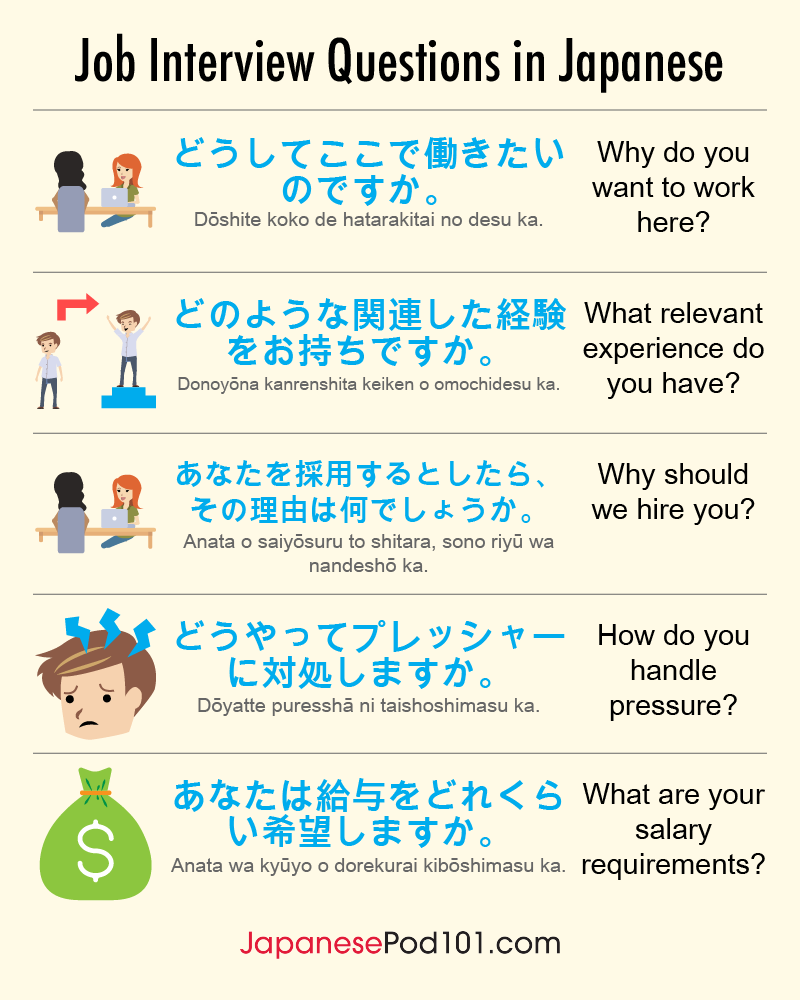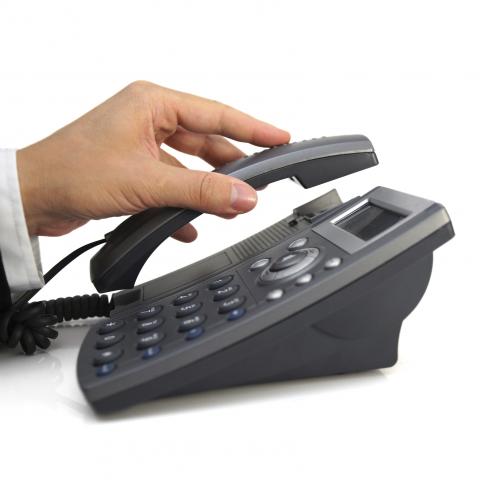Now that you’ve been learning Japanese for a while, do you plan on working in Japan or with Japanese speaking clients? Knowing the basic Japanese business phrases will help you communicate smoothly and build better relationships with your colleagues and clients.
Business Japanese is quite different from the casual Japanese used in daily life. It’s important to know particular expressions for work and how to express yourself formally in context of the Japanese business etiquette and culture. Even if you’re not yet fluent, being able to give a courteous greeting in Japanese can make a huge difference, even if it’s just for a business trip to Japan.
In this article, we’ll introduce the most useful Japanese business phrases you need to know for job interviews, meetings, communication with coworkers, handling phone calls and emails, and helpful tips about Japanese business culture.
Bring yourself up a level here at JapanesePod101.com!
 Table of Contents
Table of Contents
- Japanese Business Culture
- Nail Your Job Interview
- Interact with Coworkers
- Sound Smart in a Meeting
- Handle Business Phone Calls
- Handle Business Emails
- How JapanesePod101 Can Help You Learn More Japanese
1. Japanese Business Culture

Before diving into the Japanese business phrases, let’s cover the basics of Japanese business culture and how it works.
1 – Japanese Business Etiquette
Politeness and respect are the most important values in Japanese culture, and these values are emphasized even more in the business world.
This is clearly pronounced in the Japanese ritual of greeting and bowing. There are various ways to bow according to the level of politeness and whom you’re greeting:
- 会釈 (Eshaku) – light greeting for colleagues / bow with upper body to fifteen degrees
- 敬礼 (Keirei) – respectful greeting for clients, gratitude, and apologies / bow with upper body to thirty degrees
- 最敬礼 (Saikeirei) – the most respectful greeting for VIP and deep apologies / bow with upper body to forty-five degrees
- → For more detailed information on how to greet and bow, please see our articles on “How to Say Hello in Japanese” and “Japanese Body Gestures.
Exchanging business cards, called 名刺 (Meishi), is another basic formality in business situations. This is typically done when you’re meeting someone for the first time, especially if the person works for another company. Business cards are considered to be one’s “face” in Japan, and therefore must be treated politely.
Here are some tips on Japanese business card usage:
When exchanging cards, stand face-to-face and offer your card with both hands, usually with a slight bow. The card must be facing toward the other person so that the receiver can read it. Accept the other person’s card with both hands, and after taking a look at it, you must put it on the table near the receiver’s seat in a neat manner. It’s considered very rude to give/receive a card with just one hand, treat it brusquely, or put the card in a card holder right after receiving it.

Exchanging business cards is one of the most important business etiquette rules in Japan.
2 – Keigo (Honorific Language) is a Must
Being able to use the appropriate Japanese business honorifics is considered good manners in Japan.
In business settings, people may be regarded as incompetent if they can’t command 敬語 (Keigo), or honorific language, properly.
The Japanese honorific language has three different forms of respectful speech:
- 丁寧語 (Teineigo) – polite language
- 尊敬語 (Sonkeigo) – respectful language
- 謙譲語 (Kenjōgo) – humble language
There are different ways of saying a given verb depending on whom you’re talking to and whose action you’re referring to. For example:
| English | Basic Verb | 丁寧語 (Teineigo) polite language express things politely – general politeness | 尊敬語 (Sonkeigo) respectful language talk about superior people, clients, and customers | 謙譲語 (Kenjōgo) humble language talk about yourself in a humble way |
| do | する suru | します shimasu | なさいます nasaimasu | いたします itashimasu |
- → To learn how to use Keigo correctly and avoid mistakes, please see our article on “Common Japanese Mistakes.”
3 – Finding a Job in Japan
Working in Japan can be difficult for foreigners because of visas, language barriers, limited options, and an unfamiliar working culture. However, there are opportunities for foreigners to find a job in Japan.
Although English is not an official language here, Japan is still one of the strongest countries economically, with a number of international companies in big cities and numerous local companies aiming to go abroad. There is also a big demand for English speakers in Japan’s educational sector.
Depending on what skills and competencies you have, your mother tongue, and how fluent you are in Japanese, finding a job in Japan is within your reach!
Our article about How to Find a Job in Japan provides detailed information for you. Check it out!
4 – Business Japanese Vocabulary
Here’s a list of frequently used vocabulary words for work.
| English | Kanji | Hiragana | Reading | |
| 1 | company | 会社 | かいしゃ | kaisha |
| 2 | corporation / enterprise | 企業 | きぎょう | kigyō |
| 3 | office | 事務所 | じむしょ | jimusho |
| 4 | department | 部署 | ぶしょ | busho |
| 5 | meeting | 会議 | かいぎ | kaigi |
| 6 | interview | 面接 | めんせつ | mensetsu |
| 7 | job vacancy | 求人 | きゅうじん | kyūjin |
| 8 | salary | 給料 | きゅうりょう | kyūryō |
| 9 | overtime | 残業 | ざんぎょう | zangyō |
| 10 | work (noun) | 仕事 | しごと | shigoto |
| 11 | work (verb) | 働く | はたらく | hataraku |
| 12 | report (verb) | 報告する | ほうこく する | hōkoku suru |
| 13 | commute (verb) | 通勤する | つうきん する | tsūkin suru |
| 14 | president | 社長 | しゃちょう | shachō |
| 15 | boss / superior | 上司 | じょうし | jōshi |
| 16 | colleague | 同僚 | どうりょう | dōryō |
| 17 | subordinate | 部下 | ぶか | buka |
| 18 | document | 書類 | しょるい | shorui |
| 19 | client | 顧客 | こきゃく | kokyaku |
| 20 | customer | お客様 | おきゃくさま | o-kyaku-sama |
You can find even more words, and their pronunciation, on our Workplace vocabulary list.
2. Nail Your Job Interview

When you get the opportunity to have an interview, make sure you give them the best impression you can!
In conjunction with a relaxed smile, a willing attitude, and confidence, the following business phrases in Japanese can help you stand out and get your dream job.
1 – ___と申します。(___ to mōshimasu.)
Translation: “My name is ___.”
The first thing you do when entering the interview room is introduce yourself.
申します (mōshimasu) is 謙譲語 (Kenjōgo), or humble language, for 言う (iu), which means “to say.” The phrase is literally translated as: “I say myself as ___,” in a humble way.
In any business setting, using Kenjōgo when referring to yourself gives the interviewer the impression that you’re very polite and decent.
2 – どうぞよろしくお願いいたします。(Dōzo yoroshiku onegai itashimasu.)
Translation: “I beg your kindness.” / “It’s a pleasure to meet you.”
Dōzo yoroshiku onegai itashimasu is a more polite version of yoroshiku onegai shimasu, one of the most commonly used phrases in Japanese. In fact, it’s unique to the Japanese language, and not easily translatable into other languages.
This phrase is very useful in any formal situation. It can be used to say something like:
- “Nice to meet you.”
- “Favorably please.”
- “Best regards.”
- “Please take care of me.”
By saying this, it shows your gratitude and humbleness in hoping to have a good relationship from that point forward.
Say this phrase after giving your name and introducing yourself, and before starting the actual interview.
- → To learn more phrases unique to Japanese, please see “Untranslatable Japanese Phrases.”
3 – 私の 強み / 弱み は___です。(Watashi no tsuyomi / yowami wa ___ desu.)
Translation: “My strength / weakness is ___.”
強み (tsuyomi) is “strength” and 弱み (yowami) is “weakness.”
In order to let the interviewer know that you are an ideal candidate for the position, explain your strengths. In addition, it leaves a good impression when you’re able to explain your weaknesses and how you can improve. This shows that you have good analysis skills, problem-solving skills, and a positive attitude.
Example:
私の強みはチームをまとめるリーダーシップと決断力です。
Watashi no tsuyomi wa chīmu o matomeru rīdāshippu to ketsudanryoku desu.
“My strengths are the leadership to pull a team together and decision-making ability.”
私の弱みは時々楽観的になり過ぎることです。
Watashi no yowami wa tokidoki rakkanteki ni narisugiru koto desu.
“My weakness is that I sometimes become too optimistic.”
4 – 私は___の経験があります。(Watashi wa ___ no keiken ga arimasu.)
Translation: “I have experience as ___.”
経験 (keiken) is “experience.”
Use this phrase when explaining your experience to show that you are a competent candidate.
Example:
私は20人のチームマネージャーの経験があります。
Watashi wa 20-nin no chīmu manējā no keiken ga arimasu.
“I have experience as a team manager of twenty members.”
5 – もう一度おっしゃっていただけますか。(Mō ichido osshatte itadakemasu ka.)
Translation: “Could you please say it again?”
おっしゃる (ossharu) is 尊敬語 (Sonkeigo), or respectful language, for 言う (iu), which means “to say.” It respectfully refers to an action the other speaker performed.
This phrase is a very polite way to ask someone to repeat what they said when you couldn’t hear or understand the first time.
You can also use this phrase if you want a little bit more time to think about how to respond. You can earn some extra time by saying this to your interviewer, without an awkward silence!
6 – いくつか質問してもいいですか。(Ikutsu ka shitsumon shite mo ii desu ka.)
Translation: “Can I ask you some questions?”
If something is unclear during the interview, you can use this phrase to let the interviewer know that you have some questions. This phrase is also very versatile; you can use it anytime and with anyone.
7 – 面接のお時間をいただき、どうもありがとうございました。(Mensetsu no o-jikan o itadaki, dōmo arigatō gozaimashita.)
Translation: “Thank you very much for making time for the interview.”
At the end of the interview, say this phrase with a smile. Make sure you don’t forget a polite bow, or 敬礼 (Keirei), before leaving the interview room.

面接を受けます (Mensetsu o ukemasu) – “take an interview”
3. Interact with Coworkers
When you talk with colleagues, it’s usually sufficient to use 丁寧語 (Teineigo), or polite language, as long as they’re your subordinate, of a similar age, or hold a similar level of job position.
However, when you’re talking to superiors, bosses, or someone respectable—such as a company president—you should use 尊敬語 (Sonkeigo), or respectful language, and 謙譲語 (Kenjōgo), or humble language, properly.
Some people use casual language when talking to their subordinates, but it’s recommended that you never use casual language in the workplace, even if you’re close to your colleagues.
1- おはようございます (Ohayō gozaimasu.)
Translation: “Good morning.”
This is the first word you should say when you show up at your workplace. Most people arrive at work in the morning, but in some industries where work starts later in the day, they still use this phrase as the first greeting upon arrival, even if it’s in the afternoon or evening.
2 – お疲れ様です/でした (Otsukare-sama desu/deshita.)
Translation: “Good work today.” / “Goodbye.”
This is another untranslatable Japanese word that is frequently used among colleagues.
It’s literally translated as “(You must be) tired” (with respect), but it can also mean “hello,” “well done,” “see you,” “goodbye,” etc. Yes, it’s a very useful phrase. Just remember that です (desu) is present tense and でした (deshita) is past tense.
When you pass by one of your colleagues in a hallway, for example, you can say this phrase to them as “hi,” which has a nuance of caring and respect. You can also use this to mean “well done” after someone finishes their presentation, and as “goodbye” or “see you” when you leave the office.
Examples:
お疲れ様でした。プレゼンとても良かったです。
Otsukare-sama deshita. Purezen totemo yokatta desu.
“Well done. The presentation was very good.”
お疲れ様でした。ではまた明日。
Otsukare-sama deshita. Dewa mata ashita.
“See you tomorrow, then.”
3 – お先に失礼します (Osaki ni shitsurei shimasu)
Translation: “Please excuse me leaving before you.”
The literal translation, broken down, is:
- お先に (osaki ni) – “before you”
- 失礼します (shitsurei shimasu) – “I do rude/impolite”
This phrase reflects the Japanese working culture, in which people feel guilty for leaving the office while their colleagues are still working. Traditionally, there is an implicit rule that you should not leave before your boss or team, even if you’ve finished your own work. This is because it’s considered impolite to do so, and it may indicate that you’re not as hard of a worker as those who are still working.
Such tradition is disappearing nowadays, but by using this phrase, you can leave the office without guilt while still being courteous to your colleagues.
4 – いってきます / いってらっしゃい (Ittekimasu. / Itterasshai.)
Translation: “I’m leaving now.” / “Take care.”
This is a standard greeting pair for when someone leaves the office to visit clients or even just to have lunch (and intend to come back later).
It’s polite to announce that you’re leaving by saying: いってきます (ittekimasu), meaning “I’m going.” Those who remain in the office should respond with the phrase いってらっしゃい (itterasshai), which means: “(You) go” with a respectful nuance.
If you want to be even more polite, you can also say いってまいります (Ittemairimasu), which is 謙譲語 (Kenjōgo), or humble language, for “I go.”
Example:
___へいってきます。
___ e ittekimasu.
“I’m going to ___.”
いってらっしゃい。
Itterasshai.
“Take care.”
5 – ただいま戻りました / おかえりなさい (Tadaima modorimashita. / Okaerinasai.)
Translation: “I’ve returned now.” / “Welcome back.”
This is another set of polite Japanese business phrases, used when someone has come back to the office.
It may sound a bit strange that you should announce when you’re leaving and coming back, but there’s a reason for it. The Japanese work culture places great value on teamwork and the concept of 報告・連絡・相談(Hō-Ren-Sō), or “Report-Inform-Consult,” for better work efficiency.
By announcing where you are to your colleagues, whether you’re going or coming back, it will make things easier on everyone. For example, if you get a phone call while you’re away or there’s an emergency, your colleagues will know where you are.
Example:
お昼休憩から戻りました。
O-hiru kyūkei kara modorimashita.
“I’m back from a lunch break.”
おかえりなさい。
Okaerinasai.
“Welcome back.”

4. Sound Smart in a Meeting
In most workplaces, meetings are inevitable.
Use our list of useful Japanese phrases for business meetings to really be present during the conversation and show your colleagues how well you’re performing.
1 – 会議を始めましょうか。(Kaigi o hajimemashō ka.)
Translation: “Shall we start the meeting?”
2 – 今日の議題は___です。(Kyō no gidai wa ___ desu.)
Translation: “Today’s agenda is ___.”
3 – ___さん、プレゼンをお願いします。(___-san, purezen o onegai shimasu.)
Translation: “Mr./Ms. ___, please start the presentation.”
さん (-san) is the most common Japanese honorific title to refer to someone politely, including colleagues. It can be used for both males and females, and it’s equivalent to the English titles “Mr.” and “Ms.” On the other hand, when you’re talking to clients or customers, you should use the more respectful 様 (-sama).
4 – この事案について、何か意見はありますか。(Kono jian ni tsuite, nani ka iken wa arimasu ka.)
Translation: “Do you have any opinions / questions on this matter?”
You can replace 意見 (iken), or “opinion,” with 質問 (shitsumon), meaning “question,” to ask: “Do you have any questions on this matter?”
To say it more politely, when talking to a client or customer for example, put the polite particle ご (go) in front of 意見 (iken) or 質問 (shitsumon). Also change ありますか (arimasu ka) to ございますか (gozaimasu ka). The end result will be:
何かご質問/ご意見はございますか。
Nani ka go-iken / go-shitsumon wa gozaimasu ka.
5 – 私は___さんの意見に賛成です。(Watashi wa ___-san no iken ni sansei desu.)
Translation: “I agree with Mr./Ms. ___’s opinion.”
You can also replace 賛成 (sansei), meaning “agree,” with 反対 (hantai), meaning “disagree.”
6 – 次の会議までに報告書を提出してください。(Tsugi no kaigi made ni hōkokusho o teishutsu shite kudasai.)
Translation: “Please submit a report by the next meeting.”

会議を始めましょうか。(Kaigi o hajimemashō ka.) – “Shall we start the meeting?”
5. Handle Business Phone Calls
Unlike business customs in other countries, Japanese business etiquette is quite strict and requires delicate attention, especially when it comes to dealing with clients and customers.
There are a lot of detailed rules for handling business phone calls, and these are considered the basics of business. They include:
- ➢ Prepare a memo pad and pen
➢ Talk with a friendly voice and speak clearly
➢ Be conscious of your role as a company representative
➢ Answer the phone in three rings
➢ When receiving a phone call, ask for the name of the speaker and company, and repeat it back to them
➢ When concluding the conversation, wait until the client/customer hangs up
➢ Never put the phone down roughly
Here’s a list of commonly used phrases for business Japanese phone conversations.
1 – はい、もしもし、___でございます。(Hai, moshimoshi, ___ de gozaimasu.)
Translation: “Hello, this is ___.”
This one is simple. When receiving a phone call, give the person your name or your company’s name.
2 – いつもお世話になっております。(Itsumo o-sewa ni natte orimasu.)
Translation: “Thank you for always being a good business partner with us.”
This is another untranslatable Japanese phrase, used as a typical greeting toward clients/customers when answering phone calls, writing emails, and even talking with them in person.
It’s literally translated as “I’m always taken care of,” and it means something along the lines of “Thank you for your always kind cooperation.” This phrase shows gratitude toward clients/customers for their favor, support, or cooperation.
3 – ___ さんはいらっしゃいますか。(___-san wa irasshaimasu ka.)
Translation: “Is Mr./Ms. ___ there?”
いらっしゃる (irassharu) is 尊敬語 (Sonkeigo), or respectful language, for いる (iru), which means “be (there).”
4 – 少々お待ちくださいませ。(Shōshō o-machi kudasai mase.)
Translation: “Please wait for a moment.”
5 – ___ はただいま外出しております。(___ wa tadaima gaishutsu shite orimasu.)
Translation: “___ is currently out of the office.”
Remember that you should not use an honorific title when talking about your colleague to a client/customer.
6 – ___ へ折り返しお電話をさしあげるよう申し伝えます。(___ e orikaeshi o-denwa o sashiageru yō mōshitsutaemasu.)
Translation: “I will tell ___ to call you back,” in a respectful way.
This is a very polite and respectful expression. さしあげる (sashiageru) and 申し伝える(mōshitsutaeru) are 謙譲語 (Kenjōgo), or humble language, for “give” and “tell,” respectively.
7 – お電話いただき、どうもありがとうございました。(O-denwa itadaki, dōmo arigatō gozaimashita.)
Translation: “Thank you very much for calling.”

少々お待ちくださいませ。(Shōshō o-machi kudasai mase.) – “Please wait for a moment.”
6. Handle Business Emails
Like phone call etiquette, Japanese business email etiquette adheres to a number of detailed rules.
Following are the basics of writing professional emails:
- ➢ Write a simple and precise subject
➢ Use TO, CC, BCC correctly and appropriately
➢ It is rude to use a read receipt function
➢ Use line breaks and shorter sentences to increase readability
➢ Write the name of the company/department/recipient at the top of the body
➢ Write a polite greeting at the beginning and the end
➢ Reply back as soon as possible, within twenty-four hours at the latest
Here’s a list of the most useful phrases for writing business emails.
1 – ___ 様 / ___ さん (___-sama / ___-san)
Translation: (“Dear Mr. ___ / Ms. ___”)
Use 様 (-sama) for clients/customers and さん (-san) for colleagues.
2 – 平素よりお世話になっております。(Heiso yori o-sewa ni natte orimasu.)
Translation: “Thank you for always being a good business partner with us.”
Here, 平素より (heiso yori) is a more polite expression than いつも (itsumo) for “always/usually.”
3 – ___の件でメールいたしました。(___ no ken de mēru itashimashita.)
Translation: “I’m writing regarding ___.”
To break it down, いたす (itasu) is 謙譲語 (Kenjōgo), or humble language, for する (suru), meaning “do.”
When you combine メール (“[e]mail”) and する (“do”), it becomes: メールする (“write/send email”).
4 – 添付資料をご確認くださいませ。(Tenpu shiryō o go-kakunin kudasai mase.)
Translation: “Please check the document attached.”
5 – 何かご不明点、ご質問がございましたら、ご遠慮なくお知らせください。(Nani ka go-fumeiten, go-shitsumon ga gozaimashitara, go-enryo naku o-shirase kudasai.)
Translation: “Should anything be unclear or if you have any questions, please don’t hesitate to ask.”
7. How JapanesePod101 Can Help You Learn More Japanese
In this article, we introduced the most useful Japanese business phrases and talked about Japanese business etiquette and culture. I hope you enjoyed today’s topic and that you were able to learn more about the Japanese culture and workplace.
If you would like more information about the Japanese language, you’ll find much more helpful content on JapanesePod101.com. We provide a variety of free lessons to help you improve your Japanese language skills. Here are some more pages on our website related to work:
And there’s so much more!
For example, when you subscribe to our Premium PLUS plan, you’ll get a personal one-on-one coaching service called MyTeacher. Your private teacher will help you practice your pronunciation and give you personalized feedback and advice to help you improve efficiently.
Learn Japanese in the fastest and most fun way with JapanesePod101.com!
Before you go, let us know in the comments if there are any business Japanese phrases you still want to know! We’d be glad to help, and we look forward to hearing from you!










